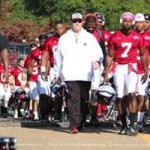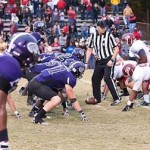By Troy Mitchell, Henderson State University
In just two years, Morgan South has become one of the best third-basemen to play softball at Henderson State University.
The sophomore from Wynne, Ark., sports an impressive .305 career batting average and 45 runs batted in. Despite her small 5-foot-3-inch frame, she is second on the team this year in home runs.
Those accomplishments might not seem to be a big deal to some, but to understand what Morgan has overcome is astounding.
At 19-months-old, Morgan was struggling to stand, let alone begin to walk. Knowing that there was something wrong, her parents Brad and Sharis took their daughter to several doctors. On several occasions they were told that Morgan may have leukemia.
Although the doctors weren’t 100 percent sure, the news was still terrifying for the young couple.
As any parents would do, the South’s wanted to know for sure what was wrong with their daughter and get her whatever help they needed.
They found their answer at the Mayo Clinic in Rochester, Minn. After several tests, it was determined that Morgan had juvenile rheumatoid arthritis.
Juvenile rheumatoid arthritis, also known as juvenile idiopathic arthritis (JIA), is the most common type of arthritis in children under the age of 16.
Juvenile rheumatoid arthritis causes persistent joint pain, swelling and stiffness. Some children may experience symptoms for only a few months, while others have symptoms for the rest of their lives.
Treatment for JIA involves intense physical therapy consisting of range of motion exercises to help maintain joint range and muscle strength.
Morgan had to attend physical therapy three to five times a week. In addition, she had to endure spending time in a Jacuzzi tub while being messaged by therapists, something the two-year-old did not enjoy.
“Every morning I would literally take her out of bed and place her into the hot tub,” said Morgan’s mother Sharis. “For 30 minutes each day I would have to massage her legs and arms just to get her to stand. I would hold on to her until we were able to get the stiffness out of her legs so she could stand and walk.”
 When Morgan was five-years-old, she went through a method of chemotherapy that seemed to work. Her body went into remission and the family was told that if she made it through puberty without any complications or the JIA flaring up, that she would grow out of it.
When Morgan was five-years-old, she went through a method of chemotherapy that seemed to work. Her body went into remission and the family was told that if she made it through puberty without any complications or the JIA flaring up, that she would grow out of it.
“The doctors and therapists felt that we had everything under control and that things were looking good,” said Morgan. “However, they did warn us that if it started to flare up again that the pain would be even worse and it would be difficult to walk.”
During the next eight years, Morgan was on a small dose of anti-inflammatory medicine to reduce inflammation and pain.
At the age of 13, the JIA reoccurred with a vengeance and the pain was unbearable.
“I was devastated,” said Morgan. “I thought I had everything under control and that it was gone. It was even more upsetting seeing what my parents had to sacrifice to help me.”
Morgan began taking a lot of medication and steroid shots. She learned to do the therapy herself by self-messaging her joints while sitting in a bath tub.
“I never went back to therapy,” said Morgan. “There wasn’t time to go to daily therapy sessions, so my parents helped with the therapy until I was able to do it myself.”
By the time Morgan reached high school, the JIA was in remission for a second time. Although she still experiences pain and inflammation at times, she knows how to treat it.
A dual-sport athlete at Wynne High School, Morgan played tennis and softball. She earned All-State softball honors her junior and senior seasons and was a four-time all-conference selection while helping her team win two state championships.
“I love playing sports and being outdoors,” said Morgan. “Staying active has helped strengthen my muscles and joints. One of the most enjoyable things I like to do is swim. It is very therapeutic and it has been a tremendous help for me.”
Aside from the inflammation and pain in the joints, juvenile rheumatoid arthritis can cause other serious complications, such as growth problems and eye inflammation.
Morgan has experienced some blurred vision in one of her eyes. For example, she can see the softball when it is pitched, but she can’t see it spin. “Nobody realizes what she has gone through,” said Sharis. “She has never complained and always had a smile on her face. She was determined to play no matter what. She is amazing and is my hero.”
The most difficult time for Morgan is when it is very cold outside or occasionally after a long double-header.
“I really haven’t had much problem this year,” said Morgan. “The one day I was hurting was after we played a double-header against Arkansas Tech. I got in the bath tub and messaged my legs for awhile. I was back on the field and ready to go the next day.”
In addition to having juvenile rheumatoid arthritis, Morgan has undergone knee surgery and has cow cartilage in one of her knees.
As a young child, Morgan was told that she would never play sports, and even today at the age of 20 she continues to beat the odds and prove doctors wrong.
“I have played softball since I was in the tee ball leagues. Once I learned how to cope with what I had, there was no getting me off the field. You are never sure when your last game could be, but when that time comes I will be satisfied knowing that I played as hard as I could and I gave 100 percent at all times.”
There is no doubting her efforts on the field. Last year as a freshman, she was named to the Great American Conference All-Tournament Team helping the Lady Reddies finish as tournament runner up.
Prior to leading the Lady Reddies into the 2014 GAC Softball Championships this weekend in Bentonville, Morgan added another honor to her resume as she was named First-Team All-GAC.
Head Coach Beth Jackson has always been a fan of Morgan’s and is amazed of what she has overcome.
“Not only is Morgan a great athlete, but a great person,” said Jackson. “She is always a pleasure to be around, she doesn’t take herself too serious, and is always up for a challenge. But that is Morgan, she has been challenged all her life. She is the type of athlete you like to keep forever.”
Majoring in human services, Morgan wants to earn a doctorate in counseling once her playing days are over.
“I have had so many people help me throughout my life and there is nothing more rewarding than being able to help someone,” said Morgan.












